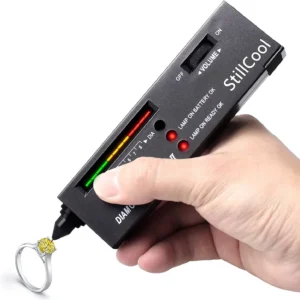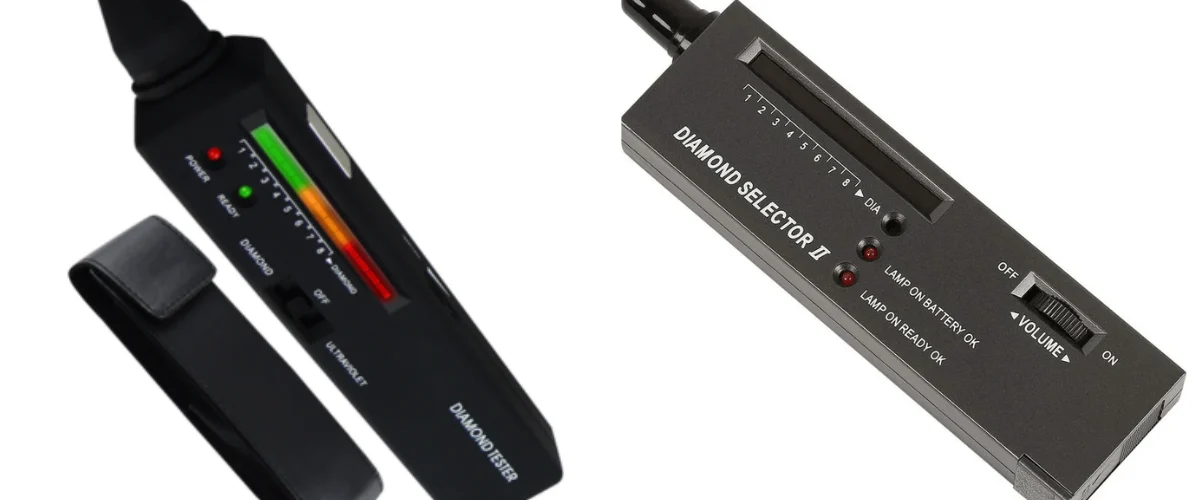We get commissions for purchases made through links in this post. View our Affiliate Disclaimer
Diamonds are considered one of the most valuable and worthy jewelries in the entire world but there will always be a question of whether what you are purchasing is real or fake. Let’s have a look at the diamond tester – an essential device that belongs to the kingdom of gemology. This article is the ultimate guide to understanding the basics of diamond testers. It will cover all the basic information on diamond testers, types, how they work and why it is crucial to use diamond testers to determine the real diamond’s quality and genuineness.
What is a Diamond Tester?
A diamond tester is a device that is used to detect whether a particular gemstone is a real diamond or an imitation. Such testers are used to identify the thermal conductivity of the diamond which is higher than almost all the other gems. The distinct characteristics of diamonds make it possible for testers to recognize them through tests.
Types of Diamond Testers
There are several diamond testers which are on the market and every one of them is unique. Some of the most common of them are:
- Thermal Conductivity Testers: These testers determine the thermal conductivity of the gemstone, well known fact that is specific for diamonds.
- Electrical Conductivity Testers: These testers can measure the electrical conduction of the gemstone, which is yet another parameter that is exceptional to diamonds.
- Ultraviolet (UV) Testers: These testers rely on the ability of UV light that will make the diamond glow, which is not common with other stones.
- X-ray Fluorescence (XRF) Testers: These testers employ X-ray to cause the atoms of the gemstone to emit special X-rays that are useful in identification of the gemstone.
How Different Types of Testers Work?
The working of different types of diamond testers is given below:
Thermal Conductivity Testing
These testers have a small, lightweight device with a probe or a sensor that should be connected to the gemstone. The tester then passes a small electric current through the gemstone, determining its thermal conductance. If the gemstone is a diamond, it will transfer heat quickly and the tester will show a positive reading.
Electrical Conductivity Testing
These testers work mutually like the thermal conductivity testers with the only difference that they measure the electrical conductivity of the gemstone.
UV Testing
These testers employ the use of ultraviolet light on the gemstone and the gemstone will fluoresce in the case of a diamond. The tester detects this fluorescence and provides a positive result.
XRF Testing
These testers employ an X-ray source; the source causes the atoms of the gemstone to emit characteristic X-rays, which are then detected by the tester. The tester then scans the X-rays to see what kind of gemstone it is.
Tips to Follow Before Using Diamond Tester
To use a diamond tester effectively, follow the given instructions:
- Clean the Tester: The tester should be clean and free from oils and dirt since they may cause a variation with the actual gemstone.
- Calibrate the Device: Always start by following the manufacturer’s guidelines to set the tester before using it on the specimen. This step is very important to avoid getting wrong values or readings.
- Test the Stone: When conducting the test, it is recommended to lightly press the probe on the surface of the stone. For thermal testers, the probe should remain in contact with the object being tested for a set amount of time.
- Interpret Results: Read the results depending on the tester’s instructions.
Pros
- Identifies real diamonds reliably.
- Simple operation for quick results.
- Affordable way to verify diamond authenticity.
- Compact and convenient for on-the-go testing.
Cons
- May mistake some simulants for diamonds.
Choosing the Right Diamond Tester
While selecting a diamond tester, you should have to consider the following factors:
- Type of Testing Needed: Depending on the stones that you usually test, it is possible to decide whether to use a thermal, electrical or a combination tester.
- Accuracy and Reliability: It is recommended to search for testers with positive feedback from others and a high degree of accuracy. In this case, it is recommended that one should invest in a combination tester to get the best results.
- Ease of Use: Select a tester that is easy to use and that has clear instructions.
- Price: Although you should concern yourself with the cost, realize that better quality may cost more and might provide more precision and sturdiness in the testers.
Why is Diamond Testing Important?
Diamond testing is important for several reasons such as:
- Authenticity: Diamond testing makes sure that the diamond is real and not imitation or a fake tsavorite.
- Quality: This can be useful in ascertaining the qualities of the diamond such as the clarity, cut and even the color.
- Value: The diamond is a very valuable product and that is why the testing of the diamond can assist in revealing the value of a particular diamond for the buyer and the seller.
- Detection of treatments: It is also used to find if diamond had been treated to change its color or to subject it to heat treatment or radiation treatment.
- Verification of diamond type: To check whether a diamond is natural or synthetic, i.e., that diamond is cultured or not.
Accuracy of Diamond Testers
Diamond testers are not completely precise in their function. The degree of precision depends on the type of tester’s technology, the quality of the tester and the proficiency of the user. Testers that come from well-known companies and manufacturers usually promise more accurate readings. However, no tester is perfect and can make mistakes. Combined ones, which use both thermal and electric conductivity techniques are usually considered to be the most accurate.
To sum up, in the field of gemology, diamond testers are indispensable instruments that guarantee the authenticity, excellence and value of diamonds. You may make wise choices when buying or selling diamonds if you are aware of the various kinds of diamond testers, how they operate and how important they are. Whether you work as a jeweler, gemologist or are just a diamond fan, diamond testers are an integral element of the diamond industry.
Product Headline Goes Here
Product Headline Goes Here



